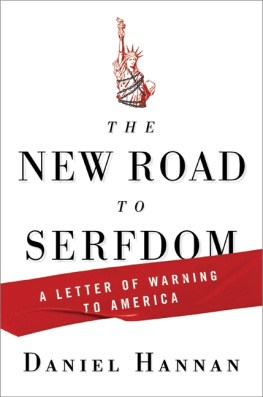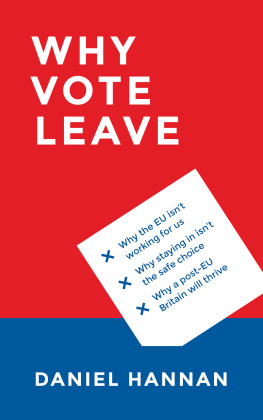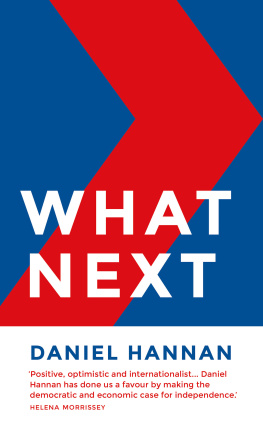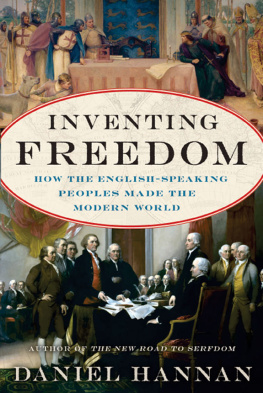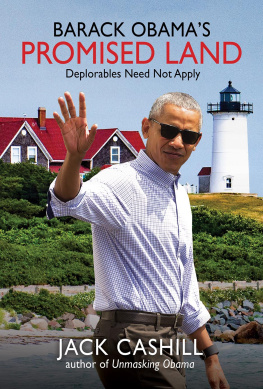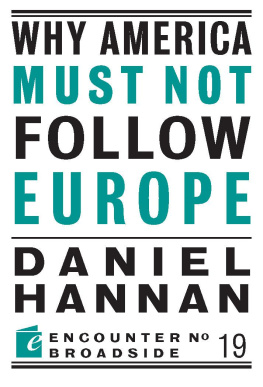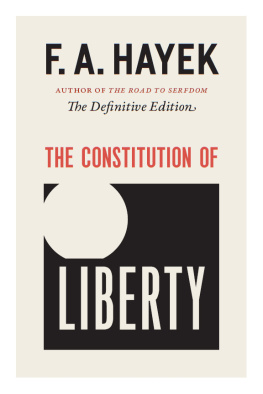Daniel Hannan - The New Road to Serfdom: A Letter of Warning to America
Here you can read online Daniel Hannan - The New Road to Serfdom: A Letter of Warning to America full text of the book (entire story) in english for free. Download pdf and epub, get meaning, cover and reviews about this ebook. year: 2011, publisher: Broadside Books, genre: Politics. Description of the work, (preface) as well as reviews are available. Best literature library LitArk.com created for fans of good reading and offers a wide selection of genres:
Romance novel
Science fiction
Adventure
Detective
Science
History
Home and family
Prose
Art
Politics
Computer
Non-fiction
Religion
Business
Children
Humor
Choose a favorite category and find really read worthwhile books. Enjoy immersion in the world of imagination, feel the emotions of the characters or learn something new for yourself, make an fascinating discovery.
- Book:The New Road to Serfdom: A Letter of Warning to America
- Author:
- Publisher:Broadside Books
- Genre:
- Year:2011
- Rating:4 / 5
- Favourites:Add to favourites
- Your mark:
- 80
- 1
- 2
- 3
- 4
- 5
The New Road to Serfdom: A Letter of Warning to America: summary, description and annotation
We offer to read an annotation, description, summary or preface (depends on what the author of the book "The New Road to Serfdom: A Letter of Warning to America" wrote himself). If you haven't found the necessary information about the book — write in the comments, we will try to find it.
The New Road to Serfdom: A Letter of Warning to America — read online for free the complete book (whole text) full work
Below is the text of the book, divided by pages. System saving the place of the last page read, allows you to conveniently read the book "The New Road to Serfdom: A Letter of Warning to America" online for free, without having to search again every time where you left off. Put a bookmark, and you can go to the page where you finished reading at any time.
Font size:
Interval:
Bookmark:
T H E
N E W R O A D
T O
S E R F D O M
to America
DANIEL HANNAN

COMMON SENSE , 1776
C O N T E N T S
The support of the State governments in all their rights, as the most competent administrations for our domestic concerns and the surest bulwarks against anti-republican tendencies; economy in the public expense, that labor may be lightly burthened; the honest payment of our debts and sacred preservation of the public faith; freedom of religion; freedom of the press, and freedom of person under the protection of the habeas corpus, and trial by juries impartially selected. These principles form the bright constellation which has gone before us and guided our steps through an age of revolution and reformation. The wisdom of our sages and blood of our heroes have been devoted to their attainment. THOMAS JEFFERSON, 1800A merican self-belief is like a force of nature, awesome and inexorable. It turned a dream of liberty into a functioning nation, and placed that nations flag on the moon. It drew settlers across the seas in the tens of millions, and liberated hundreds of millions more from the evils of fascism and communism. If it has occasionally led the United States into errors, they have tended to be errors of exuberance. On the whole, the world has reason to be thankful for it.
Every visitor is struck, sooner or later, by the confidence that infuses America. It is written in peoples faces. Even the poorest immigrants rarely have the pinched look that dispossessed people wear on other continents. Instead, they seem buoyant, energetic, convinced that, when they finish their night classes, they will be sitting where you sit in your suit.
I felt the pulse of American optimism even as a young child, though I had no words for it. My uncle had moved to Philadelphia from a village in the west of Scotland. He never lost his accent and was known to the end of his days as Scotty in the bars of north Philly. Yet he seemed to have lost all traces of the self-consciousness that Scots usually recognize in one another. He had somehow grown into his adopted country, becoming commensurately cheerful and expansive and confident and loud.
When I was eighteen, I spent two months meandering slowly down the Mississippi from Chicago to New Orleans with a college friend. Afterward, we traveled across the South, lingering for several days in Birmingham, Alabama, for no better reason, as I recall, than that we liked the Lynyrd Skynyrd song about it. Before flying home, we were (as was traditional in those pre-Giuliani days) mugged in New York City. We felt we had savored a measure of the diversity of American life. And, beneath the superficial differences, we kept finding the same character traits: enthusiasm, artlessness, impatience, optimism.
Only much later did it occur to me that these are not innate characteristics. Every American, after all, must at some stage have arrived from somewhere else and, like my uncle, shed an earlier identity. American optimism is not a genetic condition, but a product of particular circumstances.
The air of the new world can work even on the casual visitor. When I write about my own countrys politics, Im as cynical as the next world-weary Brit. But, whenever I go to Washington, I give in to the guileless enthusiasm that foreigners so often dismiss as navet. Like James Stewarts character in Mr. Smith Goes to Washington, I goggle reverently at the Lincoln and Jefferson memorials, The Battle Hymn of the Republic swelling in my mind.
At least I used to. On my most recent visit, as I stood before the statue of your third president, I fancied I heard a clanking noise. Doubtless it was Jeffersons shade rattling his chains in protest at what is being done to his country. The ideals for which he had fought, and which he had incorporated into the founding texts of the republicfreedom, self-reliance, limited government, the dispersal of powerare being forgotten. The characteristics that once set America apart are being eliminated. The United States is becoming just another country.
To put it another way, the self-belief is waning. Americans, or at least their leaders, no longer seem especially proud of their national particularisms. The qualities that make America uniquefrom federalism to unrestricted capitalism, from jealousy about sovereignty to willingness to maintain a global military presencenow appear to make Americas spokesmen embarrassed.
One by one, the differences are being ironed out. The United States is Europeanizing its health system, its tax take, its day care, its welfare rules, its approach to global warming, its foreign policy, its federal structure, its unemployment rate. Perhaps Americans are keen to fit in. Perhaps they feel awkward about being the odd man out.
Im struck by how many American liberals now seem to see their country through European eyes. You are especially likely to meet these embarrassed Americansunderstandably enough, I supposein Europe, where they are keen to impress on you that they never voted for George Bush.
We dont have anything like this in the States, they say wonderingly, over and over again. A middle-aged lady from Jersey City with whom I spent an afternoon in the French Basque country repeated the line so often that, after a while, I snapped and retorted, Yes you do: Theyre called restaurants, for heavens sake.
For years, some Europeans have clutched at enduring myths about Americans. Fair enough, you might say: All peoples stereotype each other. The new and unsettling development is how many American lefties have started to believe these myths about themselves.
I have a young cousin from Colorado: a clever, charming, beautiful girl. Like most first-time voters, she enthusiastically backed Barack Obama. Among the many hopes she had for him was that he would make the United States more popular by bringing it into line with other countries.
But heres the thing: Despite having studied and traveled in Europe, she has a number of fixed ideas about the difference between the Old and New Worlds. She is convinced, for example, that Europeans are politer than Americans. Lots of Americans think this, and its very flattering. But, believe me, it is utter rot. Americans come across to us as courtly and prim, careful to avoid bad language, punctilious about using correct titles, almost never drunk in public. How anyone can visit, say, Paris and come back thinking that Europeans are unusually well-mannered is beyond me. My cousin sort of knows all this. But she still likes to cling to her image of the boorish Yank, even if she rarely sees it actualized.
While were about it, lets explore a few more of these ides fixes.
Americans know nothing of the world: most of them dont even have passports. International travel is, of course, partly a function of geography: the distance from Los Angeles to Miami is the same as that from London to Baku. But there are plenty of Europeans who rarely travel. Its just that, for some reason, the stay-at-home tendencies of the peasant farmer in Calabria or Aragon are treated as a national treasure rather than a sign of parochialism. America is a young country. It has no history. In fact, the United States is older than virtually every country in Europe. Most European states have drawn up their constitutions since 1945. Several didnt exist as nation-states at all until after World War I. Even Germany and Italy, as political entities, date only from the late nineteenth century. The extraordinary longevity of the U.S. Constitution is eloquent tribute to the success of Americas political model. Americans are great polluters: theyre addicted to their cars. Cars, too, are a function of geographyand, indeed, of history. The United States is spacious; its land is cheap; its towns were generally built after the invention of the automobile, and therefore without the narrow streets that characterize European villages. These factors have made Argentines, Australians, and South Africans every bit as addicted to their cars as Americans. And, indeed, despite punitive taxation, congested roads, and a broad range of alternatives, Europeans, too, seem to like driving: hence the number of coercive policies needed to stop them. The United States is a country of endless suburbs. Yes, and very pleasant they are. You couldnt say the same of the tower-blocks that ring most French, Dutch, or Belgian cities, seething with angry immigrants. Indeed, when French politicians want to euphemize the issues of street crime and social breakdown, they call it le problme des banlieues: the suburb problem. Americans have no culture. Where is their Shakespeare? Americas Shakespeare, obviously, is Shakespeare. Since he died four years before the Mayflower set sail, he is surely just as much the property of those Englishmen who carried his works to new lands as of those who stayed behind. If we look at more recent history, Id have thought a canon that includes Ralph Waldo Emerson and Mark Twain, Emily Dickinson and John Steinbeck, F. Scott Fitzgerald and Ernest Hemingway, can hold its own against most comers. Americans are in love with guns. Their society is crime-ridden. Certainly there are more guns in the United States than in Europe (except freedom-loving Switzerland). And, yes, that imbalance has an impact on crime figures, both positively and negatively. The U.S. states that have the laxest gun laws have more homicides, but many fewer burglaries and muggings: Criminals, like the rest of us, are capable of making risk assessments. Why is it, though, that when a disturbed American teenager murders his classmates, it is invariably described as another example of Americas love affair with the gun, whereas when the same thing happens in, say, Finland, it is simply a tragedy from which it would be insensitive to draw political conclusions? American TV is trash. Oh, come on. The world watches U.S. television, from The Sopranos to The Simpsons. If you want truly abominable television, try the diet of game shows and soaps served up across much of southern Europe. How anyone can watch Italian TV, and then claim with a straight face that American programming is junk, completely defeats me.Next pageFont size:
Interval:
Bookmark:
Similar books «The New Road to Serfdom: A Letter of Warning to America»
Look at similar books to The New Road to Serfdom: A Letter of Warning to America. We have selected literature similar in name and meaning in the hope of providing readers with more options to find new, interesting, not yet read works.
Discussion, reviews of the book The New Road to Serfdom: A Letter of Warning to America and just readers' own opinions. Leave your comments, write what you think about the work, its meaning or the main characters. Specify what exactly you liked and what you didn't like, and why you think so.

